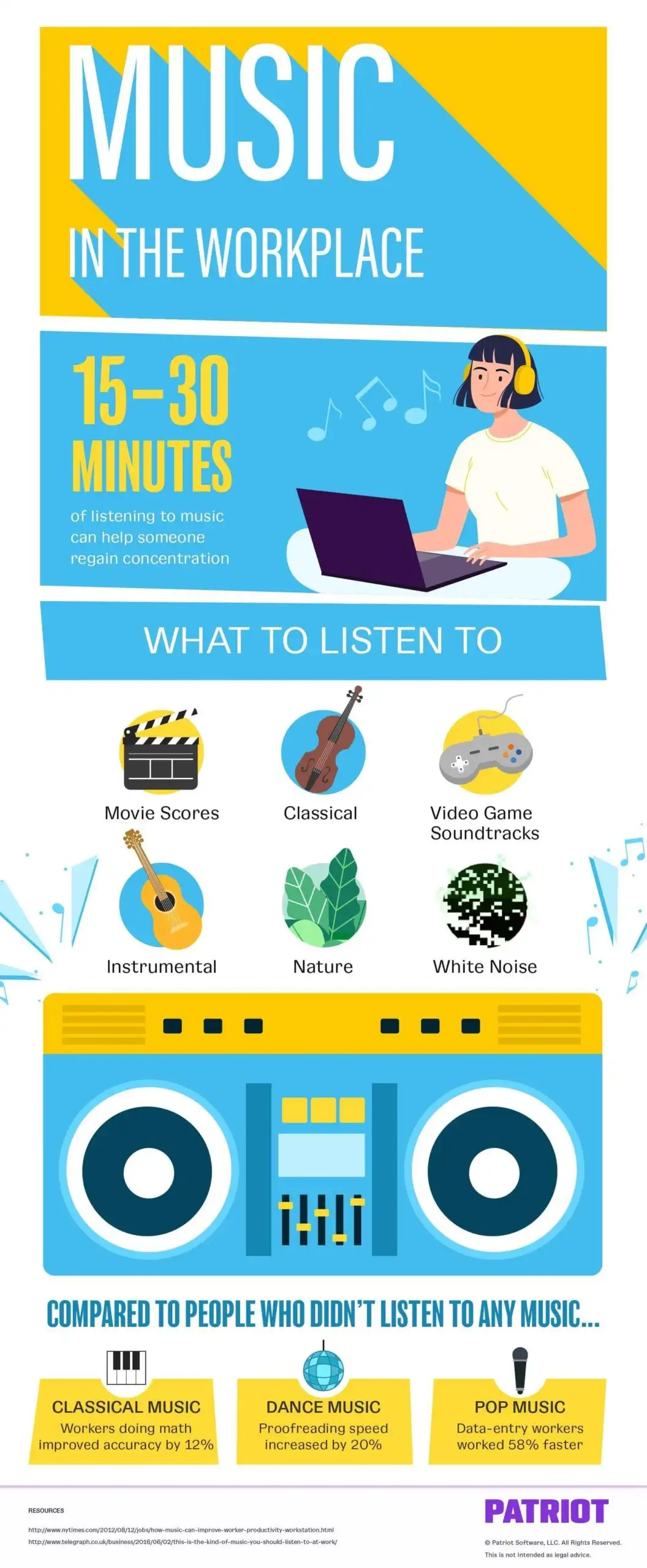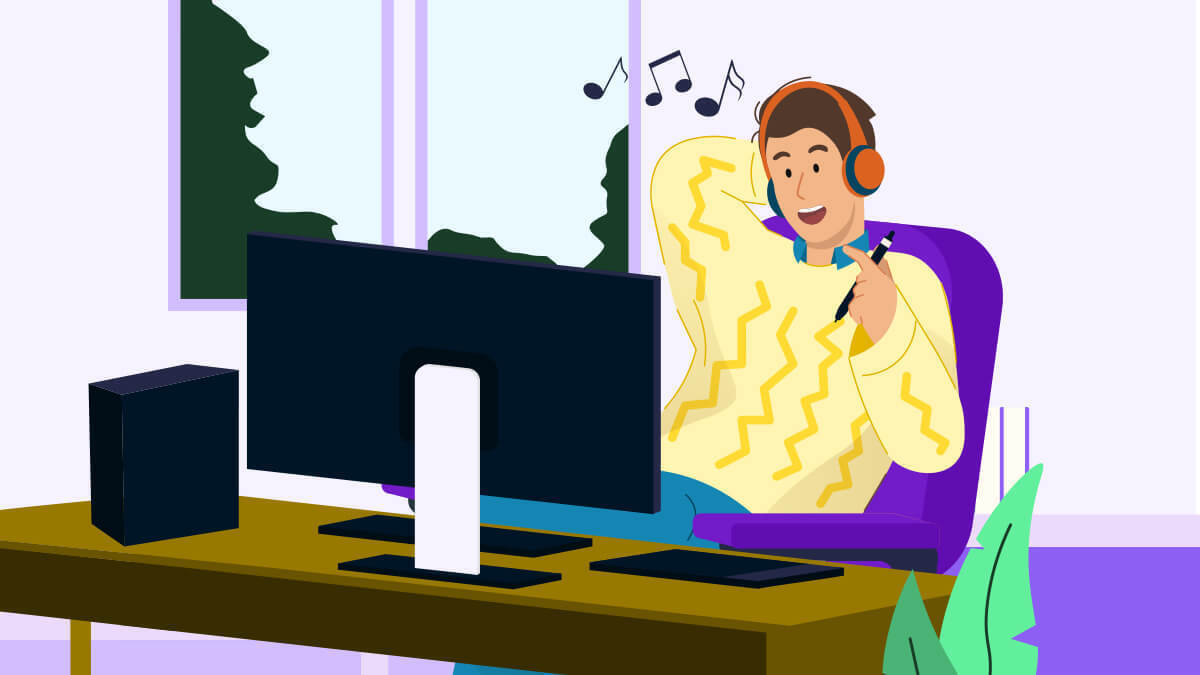Do your employees like listening to music while they work? For many, music helps increase engagement, morale, and overall productivity. But, is music in the workplace actually beneficial to your business’s growth?
To find out, we’ll go over:
- Benefits of music in the workplace (and disadvantages)
- Music in the workplace research
- Creating a policy to address music
- Headphones and safety
Benefits & disadvantages of music in the workplace
So, is music in the workplace good or bad? Like anything else, there are both pros and cons to letting employees listen to music through their headphones or speakers.
The Pros. Listening to music in the workplace can help employees:
- Focus on work
- Absorb information
- Stimulate creativity
- Drown out co-workers
- Break up mundane tasks
- Boost morale
The Cons. Music in the workplace may hinder productivity because it could:
- Prevent employees from hearing customers or co-workers
- Bother another worker
- Cause distractions
Advantages and disadvantages of listening to music at work can depend on the industry, employee’s position, and the employee’s work habits.
Music in the workplace research
So, can music make employees more productive? Take a look at what the research found on music in the workplace:
Who lets employees listen to music? Computer programming, data analytics, advertising, and marketing are the areas most likely to let employees listen to music.
Who’s listening? According to one set of music in the workplace statistics, half of respondents say they listen to music regularly at work.
Productivity: One study found that 73% of warehouse workers were more productive when there was background music playing. And, 65% of businesses thought music made them more productive.
Accuracy: Another study reported in The Telegraph found that 88% of workers doing data-entry, solving math problems, and proofreading produced more accurate work, and 81% worked faster when listening to music.
Concentration: According to Dr. Sood at the Mayo Clinic, 15 – 30 minutes of listening to music can help someone regain concentration.
Mood: Music, regardless of the genre, can help relax employees, which can improve productivity.
Distractions: Listening to background music can disturb the reading process, according to one analysis.
Recharging with music might be the boost many employees need to engage with their work. And, there are many advantages of employee engagement, like increased productivity, accuracy, and concentration.
However, music might be distracting to some employees. Not to mention, whether music helps or hurts might depend on the type of music…

How types of music influence productivity
Productivity may differ by the type of music an employee listens to and their job duties. For example, music with lyrics might hinder productivity more than help it.
One study by Cambridge Sound Management found that speech was the most disturbing noise to 48% of employees. And, employees wasted 21.5 minutes per day as a result.
In some cases, music genres without lyrics might boost productivity more than music with speech. Here are some types of music that might help employees stay focused:
- Classical
- Instrumental
- Movie / TV scores
- Video game soundtracks
- Nature
- White noise
Basically, some research shows that music without lyrics is best for people to focus. But for some people, music like rock, hip-hop, jazz, alternative, etc. can be best.
The music that helps an employee with productivity may also depend on what the worker is doing. Is your employee doing physical labor or sitting at a desk doing research? Different jobs might require different genres.
According to The Telegraph study, employees with different positions increased their productivity depending on the types of music they listened to. The percentages show the difference between listening to music as opposed to not listening to any music:
- Classical music: Workers doing math problems improved their accuracy by 12%
- Pop music: Data-entry workers worked 58% faster while listening to pop music
- Dance music: Workers increased their proofreading speed by 20%
And, no two workers are the same. Employees have different preferences, and they (most likely) know what types of music help them streamline operations.
A word about speaker systems: Now, what about if you want to play music over your workplace’s speaker system? Before doing so, make sure it is OK with your employees. And if customers can hear the music, check that it’s appropriate. Stay away from offensive or distracting music.
Want to impress your friends at a dinner party?
Get the latest small business news delivered straight to your inbox.
Creating a policy to address music
Whether you allow, disallow, or limit music in the workplace, you should create a policy and add it to your employee handbook. This can help you and your employees avoid confusion.
If you limit your employees’ ability to listen to music, include information like:
- Which positions can listen to music
- How employees can listen to music
- Best practices
You might not allow certain positions to listen to music. For example, you may restrict employees who directly deal with customers or work closely with other employees from listening to music. If a customer or co-worker has a question for an employee listening to music, trying to get their attention could get frustrating.
Maybe you have rules on how employees can listen to music. You might allow music but not allow streaming services. Streaming is where employees use an app or website to listen to music that is not downloaded onto their devices.
Employees should be courteous when listening to music. They shouldn’t sing with the music out loud. And, the volume shouldn’t be so loud that the employee can’t hear anything else.
Headphones and safety
Wearing headphones could be dangerous in certain industries, like construction. Depending on your business, you might need to restrict listening to music so your employees are safe.
If the work your business does is dangerous or has the potential to result in injury, your workers should stay away from using headphones. Having music blasting in their ears can result in the employee not being aware of their surroundings.
For example, you have an employee operating heavy machinery and listening to music in their headphones. A problem comes up, and a co-worker tries to get their attention. Because of the music, the worker operating the machinery can’t hear. Avoid issues like this by regulating listening to music.
Keep in mind that OSHA (the Occupational Safety and Health Administration) regulates safety in the workplace. One of OSHA’s laws on playing music in the workplace is that music player headphones don’t count as hearing protection from loud and damaging noises.
This article has been updated from its original publication date of August 25, 2017.
This is not intended as legal advice; for more information, please click here.



